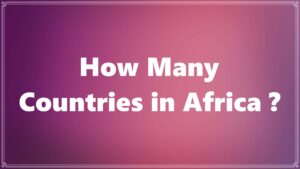Countries in Africa: Many people often wonder, “How Many Countries in Africa?” because Africa is so big and different. This piece goes into great detail about how to understand the complicated political situation in Africa.
There are big differences between African countries in terms of size, people, and economic growth. Every country has its own unique mix of history and progress, from the busy cities of Nigeria and South Africa to the peaceful regions of Seychelles and Djibouti.
Over many hundreds of years, the lines between African countries have changed a lot. When colonial powers split up land, they didn’t care about the ethnicities or cultural boundaries of the people who lived there before them. This created a legacy of complexity and sometimes conflict.
How Many Countries in Africa ?
Straight answering the question isn’t as easy as it looks. Africa is made up of 54 countries that are recognized by the UN. But arguments keep going because of geopolitical conflicts and the fact that some regions want to be recognized.

There are problems counting African countries because of disputed areas, unrecognized states, and changing political situations. There are differences because of many things, such as historical claims, racial tensions, and global concerns.
List of Countries in Africa
| S. No. | Country | Sub-region |
|---|---|---|
| 1 | Nigeria | Western Africa |
| 2 | Ethiopia | Eastern Africa |
| 3 | Egypt | Northern Africa |
| 4 | DR Congo | Middle Africa |
| 5 | Tanzania | Eastern Africa |
| 6 | South Africa | Southern Africa |
| 7 | Kenya | Eastern Africa |
| 8 | Uganda | Eastern Africa |
| 9 | Sudan | Northern Africa |
| 10 | Algeria | Northern Africa |
| 11 | Morocco | Northern Africa |
| 12 | Angola | Middle Africa |
| 13 | Ghana | Western Africa |
| 14 | Mozambique | Eastern Africa |
| 15 | Madagascar | Eastern Africa |
| 16 | Côte d’Ivoire | Western Africa |
| 17 | Cameroon | Middle Africa |
| 18 | Niger | Western Africa |
| 19 | Mali | Western Africa |
| 20 | Burkina Faso | Western Africa |
| 21 | Malawi | Eastern Africa |
| 22 | Zambia | Eastern Africa |
| 23 | Chad | Middle Africa |
| 24 | Somalia | Eastern Africa |
| 25 | Senegal | Western Africa |
| 26 | Zimbabwe | Eastern Africa |
| 27 | Guinea | Western Africa |
| 28 | Rwanda | Eastern Africa |
| 29 | Benin | Western Africa |
| 30 | Burundi | Eastern Africa |
| 31 | Tunisia | Northern Africa |
| 32 | South Sudan | Eastern Africa |
| 33 | Togo | Western Africa |
| 34 | Sierra Leone | Western Africa |
| 35 | Libya | Northern Africa |
| 36 | Congo | Middle Africa |
| 37 | Central African Republic | Middle Africa |
| 38 | Liberia | Western Africa |
| 39 | Mauritania | Western Africa |
| 40 | Eritrea | Eastern Africa |
| 41 | Gambia | Western Africa |
| 42 | Botswana | Southern Africa |
| 43 | Namibia | Southern Africa |
| 44 | Gabon | Middle Africa |
| 45 | Lesotho | Southern Africa |
| 46 | Guinea-Bissau | Western Africa |
| 47 | Equatorial Guinea | Middle Africa |
| 48 | Mauritius | Eastern Africa |
| 49 | Eswatini | Southern Africa |
| 50 | Djibouti | Eastern Africa |
| 51 | Comoros | Eastern Africa |
| 52 | Cabo Verde | Western Africa |
| 53 | Sao Tome & Principe | Middle Africa |
| 54 | Seychelles | Eastern Africa |
Dependencies or other territories in Africa
| S. No. | Territory | Dependency of |
|---|---|---|
| 1 | Réunion | France |
| 2 | Western Sahara | (disputed) |
| 3 | Mayotte | France |
| 4 | Saint Helena | U.K. |
FAQs
Q. Are there exactly 54 countries in Africa?
A. While 54 countries are recognized by the United Nations, disputes and claims over certain territories make the count somewhat contentious.
Q. Which African country has the largest population?
A. Nigeria holds the title of the most populous African nation, with over 200 million people.
Q. Are there any territories seeking recognition as independent countries in Africa?
A. Yes, several regions within Africa, such as Western Sahara and Somali land, have declared independence but lack international recognition.
Q. How have colonial borders impacted African nations?
A. Colonial borders often divided ethnic groups and disregarded traditional territories, leading to enduring conflicts and tensions.
Q. What factors contribute to border disputes in Africa?
A. Border disputes in Africa stem from historical claims, ethnic divisions, resource allocation, and geopolitical interests.
Q. Is Africa’s geopolitical landscape stable?
A. While many African countries enjoy relative stability, occasional conflicts and border disputes highlight ongoing challenges.
Conclusion
In the end, answering “How Many Countries in Africa?” gives us more than just a number. It shows us a complicated web of history, politics, and culture. Africa needs to recognize and deal with its many different nation-states if it wants to be united and progress.
